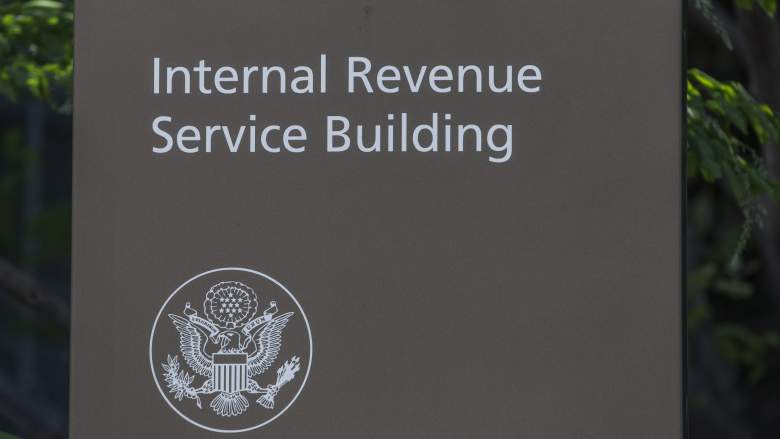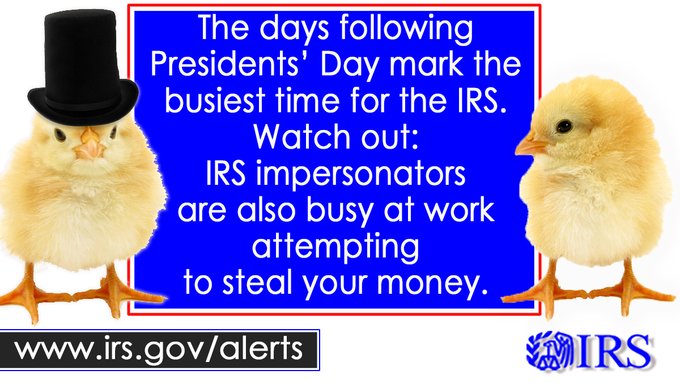
Getty IRS building
Happy Presidents Day! Today we’re enjoying a federal holiday on Monday, February 17, 2020. And because it’s a federal holiday, that includes the IRS office, which is also closed for Presidents Day. Here are more details about what’s happening with the IRS and Presidents Day 2020.
IRS Offices Are Closed on Presidents Day
Under the telephone hours webpage for the IRS, the IRS notes that its offices are closed on federal holidays, linking to OPM.gov. OPM notes: “Federal law (5 U.S.C. 6103) establishes the public holidays listed in these pages for Federal employees.” For 2020, February 17 is listed as a public holiday for federal employees. It’s called “Washington’s Birthday” in federal holiday lingo, but that’s technically the same as Presidents Day.
OPM notes: “This holiday is designated as ‘Washington’s Birthday’ in section 6103(a) of title 5 of the United States Code, which is the law that specifies holidays for Federal employees. Though other institutions such as state and local governments and private businesses may use other names, it is our policy to always refer to holidays by the names designated in the law.”
In other words, yes, IRS offices are closed on Presidents Day because it’s a federal holiday. Note that because of the holiday, the schedule for getting your tax refund notes that you can expect a direct deposit refund by February 28 (or by mail on March 6) if you file by February 18, the day after Presidents Day.
Local Taxpayer Assistance Centers are also closed on all federal holidays, including Presidents Day.
A call to the IRS 1-800 number confirmed that the phone line is also closed today and only available for automated services. Sometimes, the IRS will still have people manning the phone lines on Presidents Day, but that’s not the case this year.
EITC and ACTC Tax Credit Refund Information Won’t Likely Be Updated Until February 22
If you’re concerned about the refund timing for the Earned Income Tax Credit or Additional Child Tax Credit, you’re going to have to wait a little longer than Presidents Day, the IRS noted. Where’s My Refund and IRS2Go are expected to be updated by February 22, not February 17. The IRS notes: “If you claim the EITC or ACTC on your tax return, the IRS cannot issue your refund before mid-February. The law requires the IRS to hold the entire refund — even the portion not associated with the EITC or ACTC. Like previous years, some tax refunds may be held if there are questions about the tax return or the IRS needs more information.”
The IRS also notes: “The IRS expects the first EITC/ACTC related refunds to be available in taxpayer bank accounts or on debit cards by the first week of March, if they chose direct deposit and there are no other issues with their tax return. Check Where’s My Refund for your personalized refund date.”
The IRS Has a Surge in Returns & Phone Calls After Presidents Day
There’s actually a big surge in tax returns and phone calls right after President’s Day, according to the IRS. If you want to call the IRS, the phone number is 1-800-829-1040. The line is typically open Monday through Friday, 7 a.m. to 7 p.m., except for federal holidays.
Because there’s a high phone demand during this time, many people are encouraged to try to find the answers they need at IRS.gov first. You can file taxes electronically and choose direct deposit for quicker refunds. Most refunds are issued within 21 days or less, and IRS customer service can’t even answer your questions about refunds until 21 days or more have passed.
The IRS’s “Where’s My Refund” tracker is available 24-7. So if you were one of the early birds who already filed your taxes, you can check the tracker on your phone or tablet any time at this link. It only updates every 24 hours though, so there’s no need to check more than once a day.
You can also use IRS2Go, which is the IRS’s official mobile app for Google Play, Amazon, and iOS. Here you can check your refund status, get tax tips and free tax preparation assistance.
READ NEXT: When Are the Democratic Primary & Caucus Elections?
